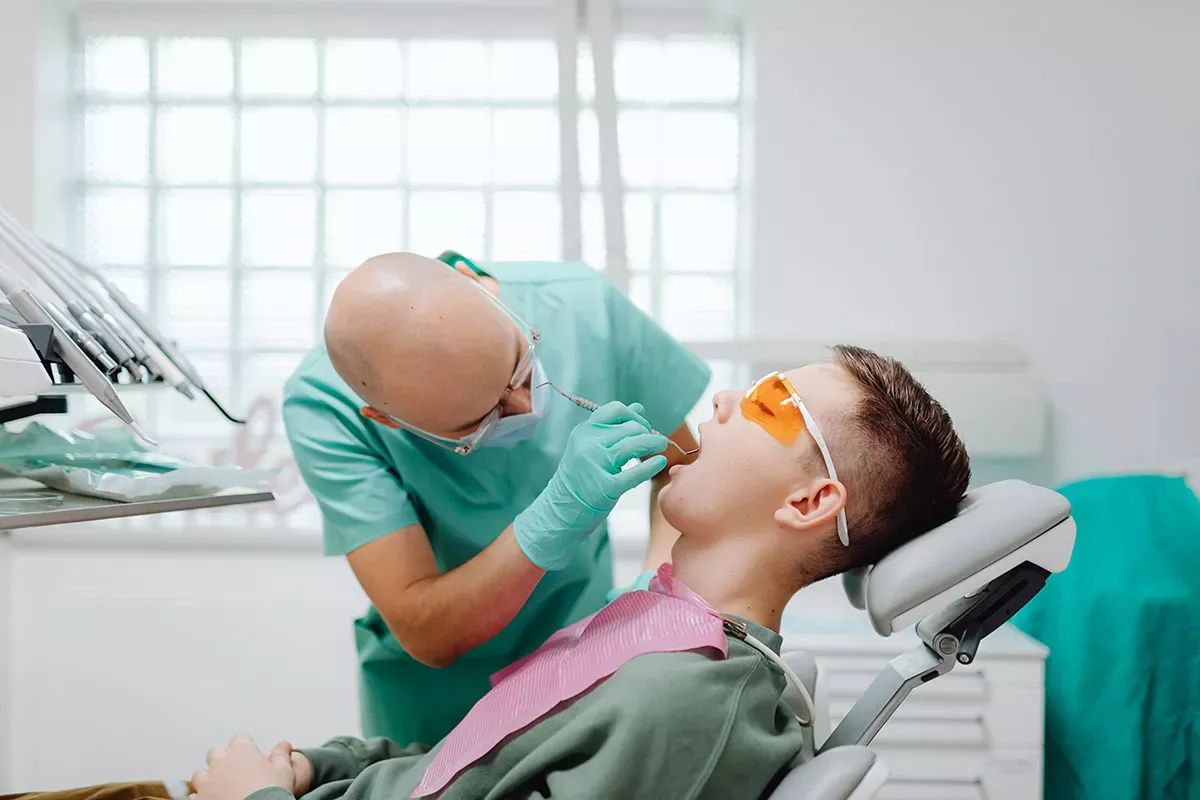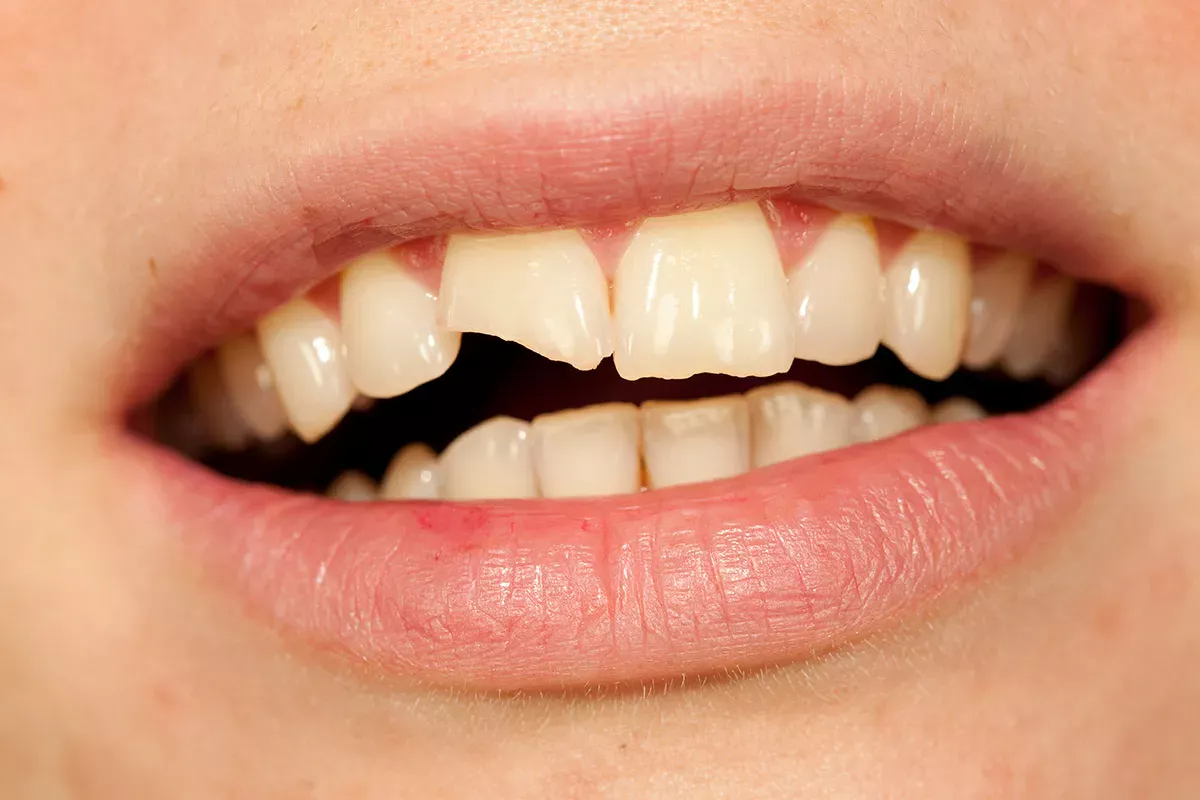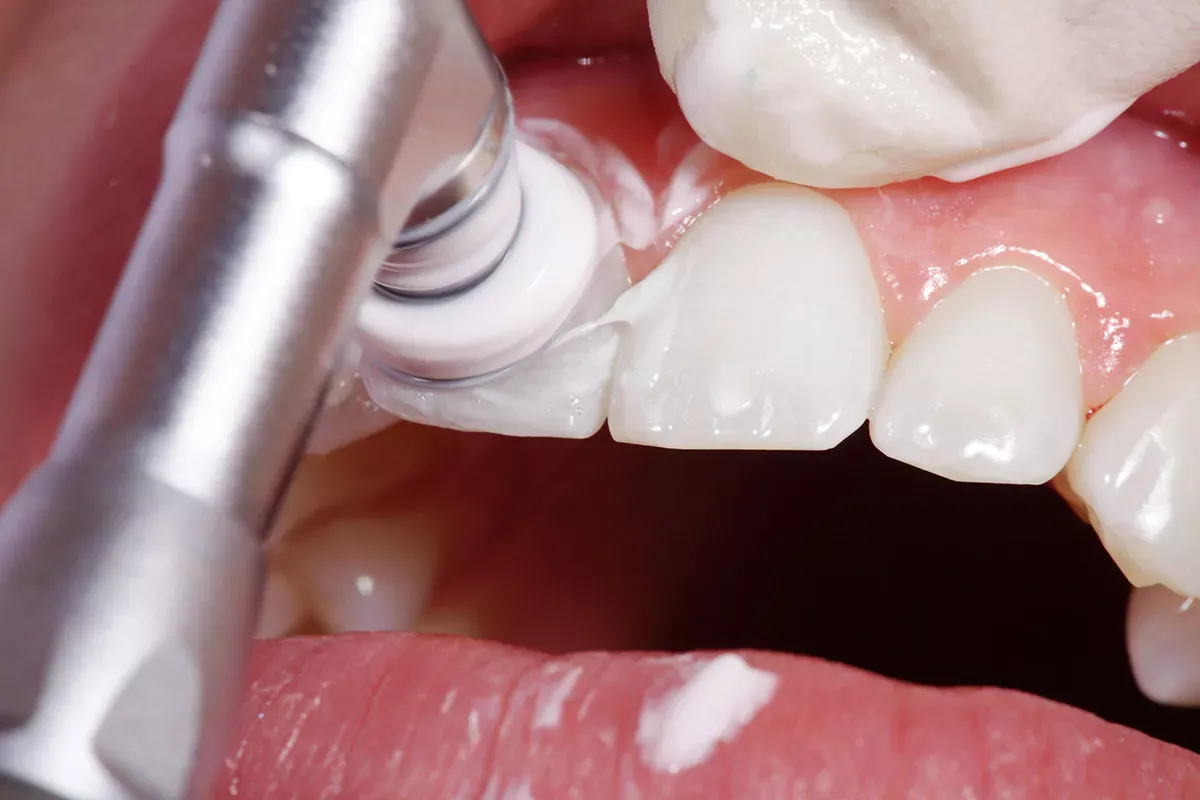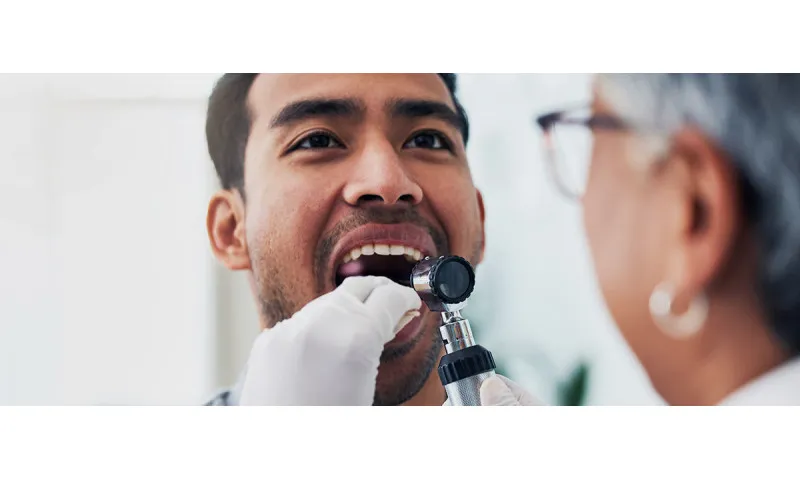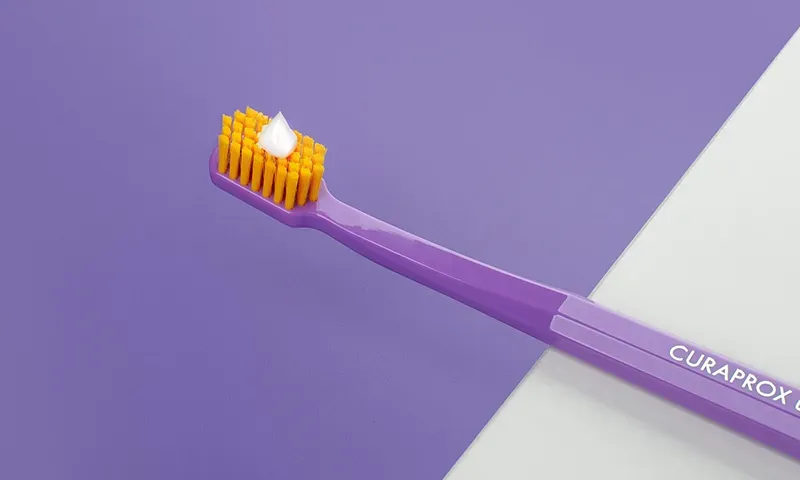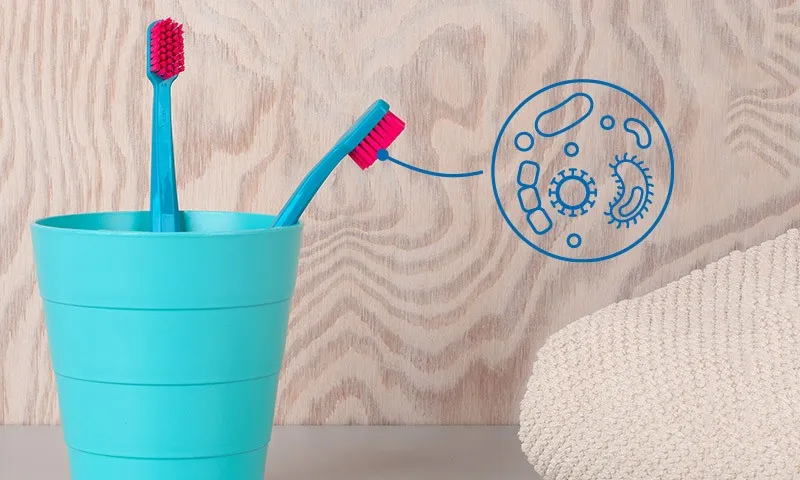The most important facts in brief
- Act quickly: To prevent the broken tooth from dying, you must place it in a tooth rescue box immediately - if possible - and head straight to the dentist. Cold UHT milk, saline solution or freezer bags are alternatives for transport, but are less suitable.
- No-gos: Please do not allow the tooth to dry out, keep it in water or touch the root surface. Never try to repair the tooth yourself or extract the remaining tooth yourself.
- Causes: If the tooth is broken off by external force, this is referred to as dental trauma. However, teeth can also break while eating - especially if they are more susceptible to fractures due to tooth decay.
- Treatment: A broken tooth can often be reattached or replaced. If not, there are various options for repairing the tooth - for example with a dental filling or crown.
- Costs: If the tooth can be bonded, inserted or treated with a filling, you will not incur any costs. If root canal treatment or a dental prosthesis is necessary, several hundred euros may be incurred.
First aid: What to do if a tooth breaks?
If you or someone close to you has broken a tooth, there are three main rules: Keep calm, get the tooth ready for transport and go to the dentist as quickly as possible. The quicker the tooth can be replaced, the better the chances of it growing back.
It is best to follow these step-by-step instructions:
1. Initial treatment of the injury
The mouth area has a very strong blood supply. This is why those affected often bleed even with dental injuries. If there is a lot of bleeding, the affected person should carefully bite on gauze (loosely woven cotton or linen dressing material) or a clean cloth to stop the bleeding and relieve pain. Cool the affected area with a cold pack or a cold flannel. Often injuries of this type look worse than they actually are. Reassure the injured person and keep a cool head. If only a small part of the tooth has broken off, the person affected will not usually feel any pain. However, if the nerve is exposed after the tooth has broken off, severe pain often occurs.
2. Tooth search
If the tooth is not completely broken, but only loosened or cracked, please do not move the tooth, but close your mouth carefully. This also applies if only a small corner of the tooth has broken off. If the tooth has fallen out of the mouth, it must now be searched for.
3. Store tooth in liquid
Soak the tooth in liquid as quickly as possible, preferably within 20 minutes. So-called tooth rescue boxes, which are available in every pharmacy and dental practice and are also frequently available in schools, are ideal. The tooth tissue can be preserved in such a box for up to 48 hours.
If you do not have access to a tooth rescue box, you can soak the tooth for a short time in chilled low-fat UHT milk (maximum one to two hours) or saline solution (maximum 30 minutes). If these things are also not available, you can also temporarily store the tooth in a freezer bag (for a maximum of 30 minutes to an hour). With all the home remedies listed, the chance of healing is less likely than if you keep the tooth in a tooth rescue box.
4. See a dentist as soon as possible
Many people ask themselves how quickly they need to see a dentist. The answer is simple: as quickly as possible. Only then is there a chance that the tooth will grow back naturally. So if your tooth breaks at the weekend, you should definitely go to the emergency dental service. The same also applies if you are on holiday.
Why does a broken tooth need to be treated quickly?
The risks of missed dental treatment after a tooth trauma are not to be trifled with. The tooth is highly unlikely to grow back naturally. In addition, the remaining tooth stump is exposed to danger: If the tooth nerve is exposed, there is a risk of inflammation of the tooth roots and gums. Symptoms of inflammation include swollen gums, severe throbbing pain and a "fat cheek" if an abscess forms with pus. In the worst case, the inflammation spreads throughout the body via the bloodstream. If left untreated, inflammation of the tooth root can lead to the tooth dying.
What does a broken tooth look like?
The appearance of broken teeth can vary greatly depending on which tooth is broken and where it happened. It is possible that only a small corner of the incisor has broken off and those affected feel a sharp edge that makes their tongue sore. However, teeth can also break off above the root or be knocked out together with the root.
What happens if a broken tooth is swallowed?
If a broken tooth is swallowed, this is not usually a cause for concern. This happens relatively frequently, especially when changing from milk teeth to permanent teeth. The tooth then simply passes through the digestive system and is usually excreted within three days. It is very rare for the tooth to get stuck in the digestive tract and cause problems such as appendicitis. You only need to see a paediatrician if your child suffers from stomach ache. If a permanent tooth is swallowed, a visit to the dentist is definitely necessary.
No-gos with broken teeth
If you want the broken tooth to be replaced, you should avoid the following things at all costs:
1. Store tooth in a dry place
If you do not store the tooth properly, but transport it in your hand or in a dry cloth, it will dry out and the tissue will die. This means it cannot be reinserted.
2. Store tooth in water
Even if water is liquid, you can never use it to preserve a broken tooth. Tooth tissue also dies within minutes in clear water.
3. Tooth cleaning
Even if the tooth is dirty, for example because it has fallen on the floor, you should not clean it under any circumstances. If it comes into contact with water, soap or disinfectants, you also run the risk of the sensitive tissue dying. The dentist will clean the tooth properly before reinserting it.
4. Keeping the tooth in the mouth
You think that the best place to keep a tooth is in its natural environment, i.e. the oral cavity? Unfortunately wrong! If you keep the tooth in your mouth, you not only run the risk of accidentally swallowing it. You can also infect it with germs from the oral cavity.
5. Touch the tooth root surface
Never touch the broken tooth on the broken side, i.e. the lower side. There are nerve cells on the open tooth root surface that you could accidentally damage. If possible, only touch the tooth at the crown.
6. Treat the tooth yourself
Under no circumstances should you attempt to repair, extract or insert the broken tooth yourself. If a tooth is broken, you need a professional who can properly assess the situation and reinsert the tooth correctly. If you do it yourself, you may damage your teeth permanently.
Causes: Why teeth break off
Unless it's a loose baby tooth, it usually takes a certain amount of force to break a tooth. However, you don't necessarily have to be playing ice hockey or involved in a fight. Even biting on a hard crust or an unexpected centre in a cherry pie can cause a tooth to suddenly break. You can find out why teeth break and which factors increase the risk here.
Dental trauma
Whether it's a fall from a bicycle, a sports injury or an accident at work - whenever external force is responsible for the broken tooth, it is referred to as a dental trauma. The incisors are particularly affected due to their position at the front of the mouth.
Dental trauma is more common in children than in adults because they are very active and can easily fall while playing and running around. Babies and toddlers can also fall and knock out their teeth due to their gross motor movements - for example when learning to walk.
When biting open
However, it can also happen that after a delicious bite into a crunchy apple or a crispy bread roll, a piece of tooth is suddenly missing. However, molars are more likely to break when biting down, especially if they are already damaged. You can find out which risk factors can cause this here:
Caries
If caries has spread over a tooth for a long time and has penetrated into the tooth interior, this tooth is much more susceptible to breakage than healthy teeth. This is especially true for people who are afraid of the dentist and therefore avoid check-ups for years.
Deep-seated caries can also lead to inflammation of the tooth root, which can cause the tooth to die if left untreated. Even teeth that are already dead can break off. You can recognise this by the fact that the tooth remains underneath are black or brown.
Good to know:
Tooth decay destroys teeth. Every child knows that. But what exactly is behind it? And how is tooth decay treated? Find out in our article:
Teeth grinding
Grinding your teeth at night exerts enormous pressure on the teeth - significantly more than chewing. This force damages the enamel over time. The teeth wear down more quickly and are therefore more susceptible to fractures.
Pregnancy
It is common knowledge that pregnancy can lead to increased problems with teeth. It is not for nothing that there is the saying "Every child costs a tooth". During pregnancy, there is an increased risk of gum inflammation and the constant vomiting damages the tooth enamel. However, this does not necessarily mean that the tooth will break during pregnancy. The number of children also has an impact on dental health later in life, as a study has shown. For example, mothers of three children over the age of 50 have on average four fewer teeth in their mouths than their peers with only two children.
Advanced age
Chipped teeth become more common with increasing age. This is especially true for people who have already reached an advanced age. Although tooth enamel is the hardest material in the human body, the ravages of time also gnaw away at our teeth.
Root canal treatment
After root canal treatment, the treated tooth is considered biologically dead. The inside of the tooth is removed and filled with a filling. This cuts off the tooth's nutrient supply and can cause it to break more quickly.
Good to know:
You can find out exactly how root canal treatment works and what the benefits and risks are in our article:
Chalk teeth
Some people suffer from so-called "chalk teeth". This is a condition in which the enamel of the permanent teeth does not harden completely, but remains soft. The teeth are therefore more susceptible to caries and fractures.
Treatment: What does the dentist do with a broken tooth?
A broken tooth can be repaired by a dentist. If you go to the dentist with a broken tooth, he will first ask you about the circumstances of the accident and discuss your medical history. They will then examine your mouth thoroughly. Imaging procedures such as x-rays may also be used to assess the part remaining in the jaw.
What exactly is done during the treatment and how long it takes depends on how the tooth has broken off:
Tooth tip broken off
If only a small part of the tooth has broken off, the treatment is very straightforward. The dentist can either glue the broken piece back on with plastic glue and a blue light lamp or repair it with a tooth-coloured filling or remodel it if you have lost the piece.
Tooth broken off halfway or down to the gum
Even if half of the tooth is broken or even more, the dentist can do a lot to save the tooth. However, it is important to act quickly. If the tooth nerve is exposed, bacteria can penetrate and cause severe inflammation. Damage to the dental nerve also causes severe pain. Root canal treatment is often necessary. The tooth nerve is completely removed and the inside of the tooth is filled with a filling. This treatment allows the tooth to remain in the jaw. The dentist then provides the tooth with a crown or partial crown.
If only the root is still inside, the dentist can either extract the remnants of the remaining tooth and close the gap with an implant, a bridge or a prosthesis, or place a crown on the remaining roots.
Tooth broken off completely
If the tooth has completely fallen out with the root, the dentist can reinsert it. However, the prerequisite for this is that the tissue on the surface of the tooth root has not dried out and died. If you have transported your tooth in a tooth rescue box, your chances are good. The situation is worse if you have chosen a different transport option.
If the tooth can no longer be replaced, the dentist will suggest a tooth replacement. You can choose from implants, bridges or dentures, for example.
Good to know:
What types of dentures are there and what are the advantages and disadvantages? You can find all the information here:
Crown broken off
If it is not the tooth itself, but a crown that has been broken off and damaged in an accident, it can usually be repaired without any problems. To do this, the dentist removes the crown completely. A dental technician then restores it in a laboratory. As this can take up to 14 days, you will be given a temporary restoration in the meantime.
Broken milk teeth
Broken parts of milk teeth are usually not bonded. Instead, the dentist grinds down the remaining part of the tooth to avoid injury from sharp edges. The dentist may also have to treat the broken tooth with a filling or a milk tooth crown - in some cases, root canal treatment may even be necessary.
If a milk tooth with a root has broken off, it is not usually replaced because there is a risk of damaging the permanent tooth underneath.
Costs: What does the health insurance fund pay?
The cost of the broken tooth depends on what treatment measures are necessary. If, for example, the tooth only needs to be bonded or a simple filling is sufficient, there are no costs for people with statutory health insurance in Germany.
The situation is different if root canal treatment has to be carried out or dentures in the form of crowns or even implants become necessary. Root canal treatment usually costs between 200 and 1000 euros. Statutory health insurance companies provide an average subsidy of 300 euros. In the case of dentures, the health insurance company pays 50 per cent of the standard treatment. The difference must be paid privately. This can easily add up to several hundred euros.
Anyone who has already taken out supplementary dental insurance before the incident can look forward to higher subsidies or complete cost coverage. Some supplementary dental insurance policies also offer retroactive cover after the tooth has been broken off.
However, if an external person is at fault for the accident, for example due to an injury during sport, it may well be that the liability insurance of the person responsible for the accident will cover the costs. However, it is important that the dentist documents the accident thoroughly and that the incident is reported to the insurance company. The same applies to accident insurance. Consequential damage can also be covered by liability or accident insurance if, for example, dentures are required after a few years. These insurances can cover costs for implants that are not covered by statutory health insurance. Important: Accident insurance only applies if the damage has been reported and is the result of an unexpected external injury.
Prevention: How can I avoid chipped teeth?
You can only protect yourself against unexpected external forces, such as a fall from a bike or an elbow that accidentally lands in your face during sport, with the right sports equipment, including a mouthguard. You have much more control over the risk factors that weaken your teeth and make them more susceptible to fractures - especially tooth decay.
Regular check-ups and professional teeth cleaning
For a tooth to become brittle due to caries, the caries bacteria must have already eaten their way deep into the tooth. To prevent this from happening, you should have regular dental check-ups. If the dentist discovers caries, the affected areas can be treated directly. Professional teeth cleaning is also useful to remove tartar. This is hardened plaque that you can no longer scrub away with a toothbrush. This is where bacteria that cause tooth decay tend to accumulate.
Healthy nutrition
A balanced diet that strengthens tooth enamel also protects your teeth. Dairy products that contain a lot of calcium and pulses are a good choice. You should only eat sweets in moderation and brush your teeth again after half an hour. Incidentally, it is particularly harmful if you eat or drink something sour first and then eat or drink something sweet straight afterwards. This makes your teeth particularly susceptible to a bacterial attack.
Good to know:
The fluoride in your toothpaste also strengthens your enamel and protects your teeth. It's best to choose a toothpaste that doesn't contain any harmful ingredients and ensures a pleasant taste in your mouth - for example, the 'Be you' range from Curaprox with apple, grapefruit, blackberry, peach, watermelon or gin and tonic flavours.
Wear a dental splint
If you grind your teeth at night, you should definitely wear a grinding splint to protect your teeth. The splints are usually made of plastic and prevent the upper and lower jaws from coming into direct contact.
Sensitise children to dangers
Children can easily fall while playing and running around and break a tooth in the process. To prevent this, you should talk to your child about dangerous situations and explain to them exactly how they should behave. For example, you can practise with your child how to protect their face and teeth in the event of a fall.
Thorough oral care
The best remedy against tooth decay is, of course, good dental care. This includes
- Brush your teeth at least twice a day - after breakfast and before going to bed for about three minutes each time
- Clean the interdental spaces daily with interdental brushes
- Clean the tongue daily with a tongue scraper
You can find out exactly how to do this and what the most effective techniques are in our instructions:
Instructions: Brush your teeth properly
Instructions: How to brush children's teeth properly
Instructions: How to brush babies' teeth properly
Good to know:
Did you know that your teeth and gums don't like it when you scrub them with high pressure and a hard toothbrush? A soft toothbrush like the CS 5460 from Curaprox with a densely packed bristle head is not only gentler on your gums, but also cleans your teeth more thoroughly.
Sources
Achilles, Patrick: Tooth swallowed: What you should know about it, on: praxistipps.focus.de.
Bundesverband der Kinderzahnärzte: A dental accident - what to do? and 12 tips for parents and grandparents: Protecting teeth - saving teeth,
Carstens, Peter: Pregnancy and teeth: Why it's true that every child costs a tooth, on: geo.de.
Casa Dentalis: Broken tooth: 6 things you need to do now!
DGZMK patient information: Dental injuries in children and adolescents.
DentNet: Tooth trauma - broken tooth - what to do?
Dentolo: Broken tooth: First aid and the right treatment.
Denvita Dental Centre Cologne: Tooth broken off.
Dr Pantas Dental Centre Düsseldorf: Tooth broken off.
Felchner, Carola: Tooth broken off, on: netdoktor.de.
Höfer, Margarita: Baby tooth chipped in a toddler? What you should do now, on: jameda.de.
Dental medicine guidelines: S2k guideline (long version): Therapy of dental trauma of permanent teeth.
Müller-Hotop, Thomas: Abgebrochener Zahn, on: ecdi.de (The European Centres for Dental Implantology).
Dr Langenbach's dental practice: Broken tooth - what to do?
Zahnexperten24: Dental accident: Information on the correct behaviour after accidents with dental injuries.
ZPK Herne: Dental trauma.
All websites last accessed on 18/10/2023.
 Swiss premium oral care
Swiss premium oral care

